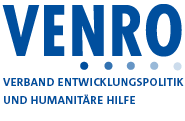During the World Humanitarian Summit in 2016 some of the major donors, United Nations agencies, and humanitarian organisations signed the Grand Bargain in order to make the humanitarian system more efficient and effective. This year marks the fifth anniversary of the Grand Bargain and the end of the initial implementation phase of its commitments. On this occasion, the Signatories are currently deciding how to move forward with a Grand Bargain 2.0.
In this interview, Regina Salvador-Antequisa, founding Executive Director of the Philippine non-governmental organisation (NGO) Ecosystems Work for Essential Benefits (ECOWEB), speaks about what has changed and what still needs to be improved in order to achieve a more inclusive, bottom-up and people-centred humanitarian assistance as foreseen in the Grand Bargain commitments on Localisation and the Participation Revolution.
What has improved in your own or your organisation’s work since the World Humanitarian Summit and the Grand Bargain 2016?
Following the Localisation and Participation Revolution commitments in the Grand Bargain of the World Humanitarian Summit 2016, ECOWEB became actively involved in the national and global localisation advocacy platforms (for example, Charter4Change and Alliance for Empowering Partnership). Localisation that recognises local capacities and a Participation Revolution that necessitates active participation of people and communities are two important commitments towards reforming the humanitarian system for strengthening local leadership and in ensuring that people are the ones at the centre of the system. While reform is still underway, our supportive international partners have helped us become one of the leading civil society organisations in the localisation movement in the country and a champion in the promotion of a survivor and community-led response to crisis approach. This approach has been applied in various crisis settings around the country.
The Signatories are currently discussing how to continue and reshape the Grand Bargain. Where do you see the most promising room for improvement in the Grand Bargain 2.0?
I see promising room for the Localisation and Participation Revolution to be improved in the Grand Bargain 2.0. But this also requires greater transparency and downward accountability of aid agencies to people affected by crisis – and not just the usual upward accountability required from locals to aid agencies and donors. The pandemic is making resources scarce, while the need for aid increases around the globe. Now, more than ever, we need to decolonise aid and make aid more empowering by enabling local leadership and the capacity of people in finding durable solutions – and not just in providing response to emergency crisis situation. The Grand Bargain 2.0 should support more the operationalisation of the nexus approach of humanitarian-development-peace-and-climate action. It should help address not only the emergency needs but also the root causes of crisis and disasters through localisation and by enhancing participation and leadership of the people affected.
Localisation remains a key focus of the Grand Bargain 2.0. How do you or your organisation deal with the various challenges linked to the implementation of localisation?
While there are international agencies who make localisation work, there are also those whose internal systems and practices don’t support localisation. Instead, they structuralise to ‘nationalise’ – that is they register their country offices as local organisation – as their idea of localisation. Thereby, they are replacing and competing instead of complementing and promoting equitable and empowering partnerships with local actors. They don’t value local leadership, participation and empowerment of people as key principles in order to make humanitarian work more effective and efficient in delivering services to the affected people. Unless donors will proactively require these agencies to institutionalise localisation through developing equitable partnerships, we expect that these intermediaries would continue to become a hindrance instead of a facilitator for localisation. Equitable partnership means complementary sharing of power, enabling local leadership and putting more resources in the hands of people.

Regina „Nanette“ Salvador-Antequisa is the founding Executive Director of Ecosystems Work for Essential Benefits (ECOWEB), a local NGO working in the Philippines, and convenor of the Philippine Community Led Emergency Action Response Network (CLEARNet). She has over 25 years of experience in peace and development work and is particularly active in international advocacy on localisation in humanitarian assistance. She is chair of the global Alliance for Empowering Partnership (A4EP) and engages both with the Charter4Change and the Local to Global Protection initiative.
| Interview |
Die Inhalte auf dem VENRO-Blog geben Meinungen und Einschätzungen unserer Autor_innen wieder. Sie können von abgestimmten VENRO-Positionen abweichen.
 Mitgliederbereich
Mitgliederbereich
